Ārepa
Craig Shearer - 6th November 2023
I have a feeling we’ve written about Ārepa before, but as a refresher, it’s a kiwi brand that produces “health drink” products that claims to make brains work better.
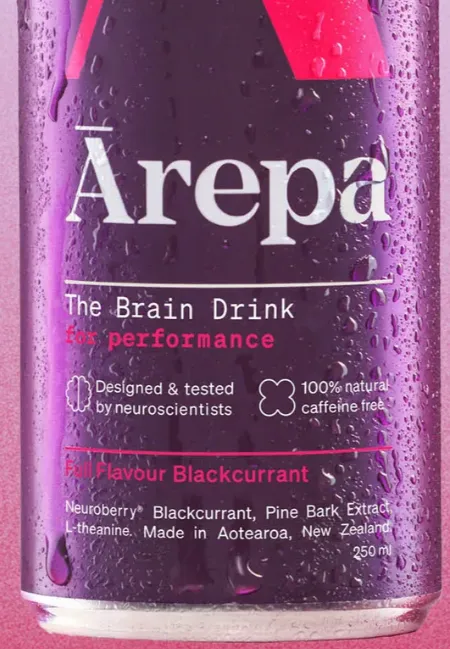
They’re recently come under fire from the Ministry of Primary Industries (MPI), being told to remove the health claims from its drinks.
The company markets itself with its branding as a premium product. Its website is slick, and definitely has an upmarket feel to it. There are various products, including drinks, powders, and capsules. Accordingly, the products are fairly pricey, coming in at $6 per 250ml serve size of the brain drinks - though cheaper if you buy more.
We regularly write about pseudoscience products that make all sorts of claims, without backup from robust scientific evidence. My feeling is that the Ārepa product is well intentioned, but nevertheless, has various aspects in its website that have a lot in common with other pseudoscientific product providers.
The product is a patented formulation containing Vitamin C, Enzogenol (which is a pine bark extract), and L-theanine. The MPI concerns are that the health benefit claims on the product and its website haven’t been substantiated.
The particular concerns of MPI seem to be based around the fact that the claimed benefits are mostly due to Vitamin C, rather than the other, more exotic ingredients - the pine bark extract and L-theanine. It would seem that various studies have established that vitamin C is crucial to cognitive performance, though whether you have enough in your blood really comes down to measurement - something that is nigh on impossible for the average person.
And, as always, more of a good thing isn’t always good - if you have enough vitamin C, having more of it isn’t going to magically give your brain superpowers! The recommended daily intake (RDI) for Vitamin C in New Zealand is just 45mg, which is quite low internationally, with the US having a higher level of 90mg for an adult male. But, eating a variety of fruits and vegetables in your diet can easily give you this level of intake.
Ārepa makes the point on their website that other “brain boosting” drinks are usually filled with sugar and caffeine, and that theirs aren’t. There’s certainly a big market of “energy” drinks that are simply high concentrations of sugar and caffeine, along with other less-evidenced additives. My understanding of these drinks is that they might give you a short-term benefit and make you “feel alive” but they can only, at best, bring you back to your optimum performance level. Drinking energy drinks isn’t a substitute for getting a good night’s sleep or eating well. And, frequent consumption of energy drinks might well have health consequences.
Ārepa have handled the MPI concerns by adding a statement to the bottom of their website.
Interestingly, their website contains a section about Ārepa in the news - but doesn’t contain any of the recent negative media coverage about it. I guess that’s the function of marketing - filter out any negative stuff and accentuate the positive.
Looking through their website makes for some interesting reading. They have a science page - Our Science - which looks like another piece of slick marketing. Indeed, the first heading on that page reads “Neuroscience, not pseudoscience”.

“From the outset, we have engaged with some of the world’s top neuroscientists and food technologists to develop the Ārepa formula. We knew when we started we would be met with scepticism due to people being falsely marketed to over the years from multinational companies selling caffeine and sugar as the ideal solution to peak cognitive performance. We continue to research, test and develop our formula as well as utilising cutting edge food-technology to ensure our products are efficacious.”
Of concern is this page, which features on The Spinoff website, which seems to be a puff piece promoting Ārepa. Indeed, at the bottom of the article, there’s this disclaimer:
“This content was created in paid partnership with Ārepa.
Ārepa is here for the big and little moments in your day with products scientifically formulated to support cognitive performance and ongoing neuroprotection. Start a subscription today and you’ll automatically receive 15% off every order.”
So, essentially it’s paid-for content which makes me suspicious.
The intriguing page on Ārepa’s website talks about an article written in The New Zealand Herald, about a clinical trial conducted in conjunction with the University of Auckland. The astounding text from that page includes the following gems:
“Our latest Clinical Trial, conducted in collaboration with the University of Auckland, has garnered a nod of approval from the New Zealand Herald.”
“The Herald’s review praised the study for its design and implementation, proving that Clinical Trials have a place in modern medicine.”
Well, I’m glad the esteemed scientific experts at the NZ Herald have been able to give a nod of approval to their study! And, well duh!, of course clinical trials have a place in modern medicine. This makes me think the page was written by a marketing person.
Anyway, the NZ Herald article made the study sound amazing. The study was based around testing the performance of 10 elite cyclists in polluted air. The cyclists were given a 7 day course of either the Ārepa drink, or a placebo.
The article states:
“Using competitive-level Kiwi cyclists, those who took Ārepa were on average able to shave 20 seconds off a 4km sprint versus those who took the placebo.”
The NZ Herald interviewed the lead researcher in the study - Lillian Morton, and she’s quoted as saying
“The difference between the performance and blood work of the study’s participants who took the seven-day course of Ārepa versus those who took the placebo was pretty amazing”
Sounds amazing, doesn’t it?… until you read the actual study, and find it didn’t say that!
From the study, in the abstract, it contains the results:
“There was a small (d = 0.31) non-significant difference (p = 0.09) in 4 km performance in PB (406.43 ± 50.29 s) vs. PL (426.20 ± 75.06 s). [emphasis mine]”
There’s that 20 seconds the NZ Herald article talks about - but in hugely variable data in a small sample size. And it’s not significant! As a scientist and lead researcher, I’d have thought that Ms Morton would know better than to misrepresent the study like that.
As always, it’s a powerful lesson to always check the primary sources, if you can, to ensure that the interpretation that a journalist is putting on a study is indeed correct.
I guess the other aspect to this is the potentially dangerous territory for universities performing research for commercial products, and then those commercial interests using that association to improve their reputation. But, I’m sure this happens all the time, and funding for science is scarce.
How did Ārepa respond?
As well as posting the modification to their website, they also came out striking back on Instragram.
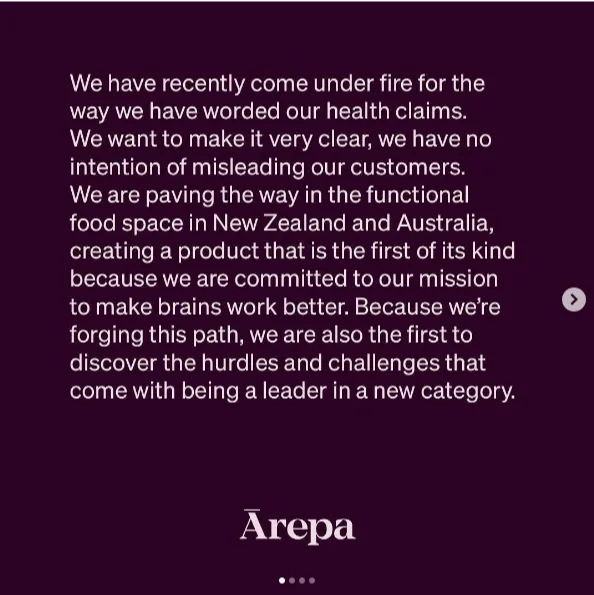
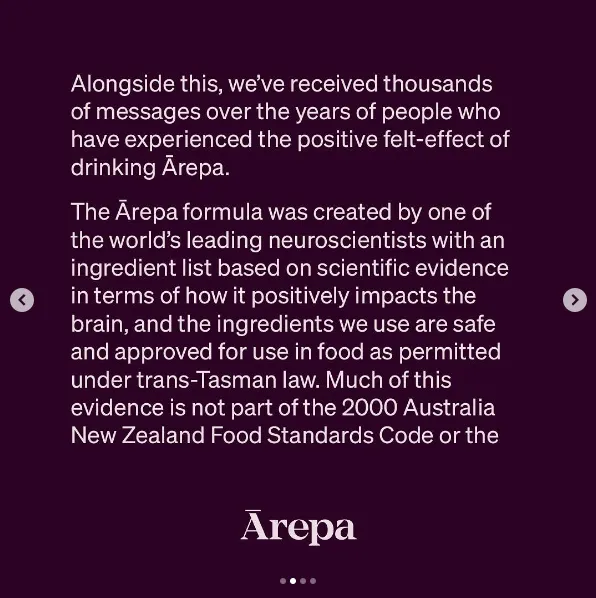
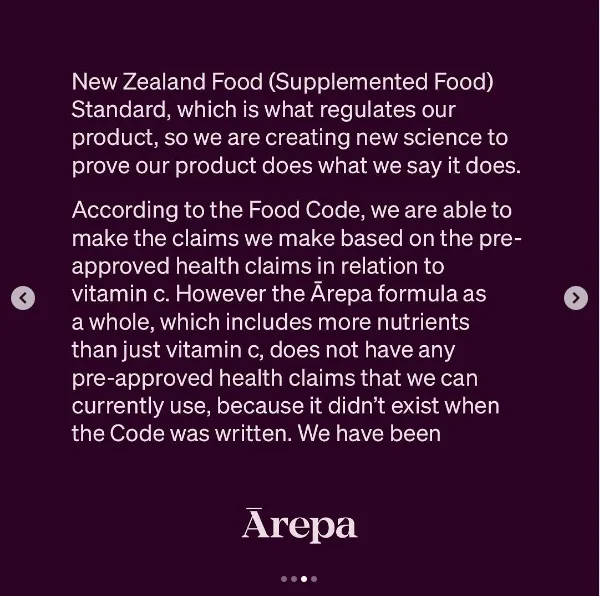
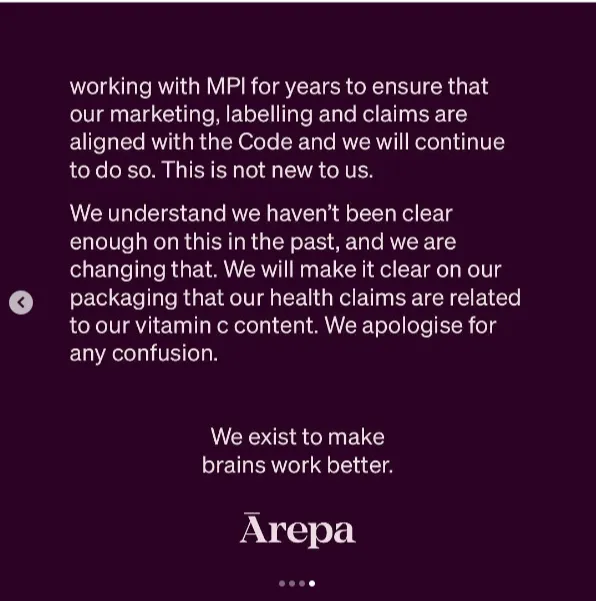
So, they’re being defensive, but blaming the laws not being up-to-date with their cutting edge product.
They should also be reminded that testimonials from their customers about the “positive-felt effect of drinking Ārepa” is not scientific evidence. Perhaps it’s all expectation, and when you’re shelling out $6 a drink, that expectation can be mightily amplified.
I’m sure there are many pseudoscience products that would make similar claims to their effectiveness.
Finally, on the claim that “we exist to make brains work better”… well it’s good to have a mission, but importantly, the company exists to sell products to its customers.
While it’s great that they’re doing scientific research attempting to show the effectiveness of their product, I think it’s reasonable to expect that that research is done in advance of marketing a product.